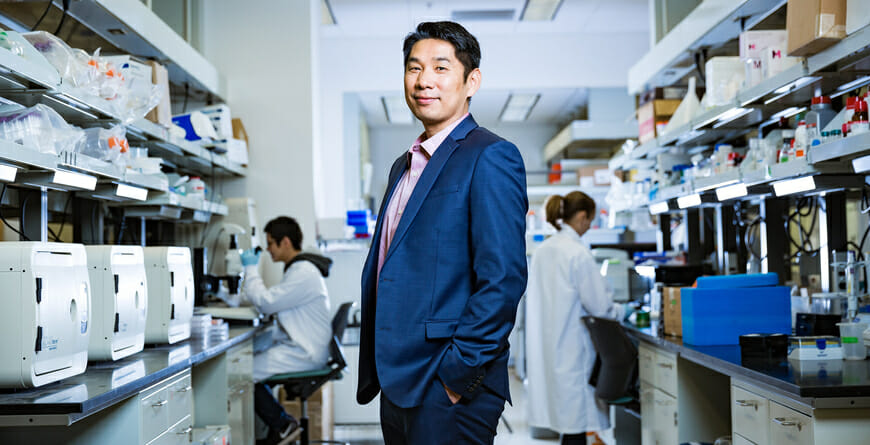
Hao Yan, director of the Biodesign Center for Molecular Design and Biomimetics at Arizona State University has been awarded the 2020 Foresight Institute Feynman Prize.
The coveted award, named in honor of visionary physicist and Nobel laureate Richard Feynman, is given annually for outstanding contributions to nanoscience in two research categories: experimental and theoretical.
This year’s award for experimental research recognizes Professor Yan’s significant contributions to the field, including major advancements in the design and construction of DNA nanostructures.
The innovative techniques that have made Yan a world leader in this fast-paced arena involve the fabrication of 2- and 3D nanoarchitectures that take advantage of DNA’s properties of self-assembly, through the base-pairing of its four nucleotides.
“I’m thrilled and greatly honored to be recognized by this prestigious prize. This award is very special because my Ph.D advisor, Ned Seeman who introduced me to the wonderful world of DNA nanotechnology, received this prize 25 years ago,” Yan said. “Thanks to all the lab members and collaboraters I have worked with, I have had the opportunity to contribute to Feynman’s original vision, using nucleic acid molecules as building blocks to engineer programmable nanostructures. The highly interdisciplinary research environment at ASU and the Biodesign Institute helps facilitate these goals.”
DNA: the ultimate erector set
Many of the nanostructures conceived in the Yan workshop involve variations of a revolutionary technique known as DNA origami, in which a predesigned nanoscale scaffold self-assembles through base pairing and is held together with a series of shorter staple strands.
Yan’s research has consistently pushed the boundaries of this method as well as devised new means of manipulating nucleic acid sequences to form virtually any shape imaginable, with precise control. The applications for these nano-creations range from tiny circuits capable of lightning calculation to storage containers for delivering smart drug molecules to protecting kidneys from acute injury.
“Since his arrival at the Biodesign Institute, Hao Yan has been a relentlessly creative force and one of the guiding lights in the rapidly advancing field of DNA nanoscience,” says Joshua LaBaer, executive director of the Biodesign Institute and director of the Virginia G. Piper Center for Personalized Diagnostics. “The discipline has wide-ranging implications for the future of computing and cryptography, nanomachinery and robotics, smart materials, nanoscale electronics and photonics, and next-generation medical advances, all of which Hao has aggressively pursued in his research.”
Indeed, Yan has created a zoo of DNA architectural forms at the scale of billionths of a meter in size. These include spheres, spirals, flasks, Möbius shapes, DNA-based computer storage and cryptography applications, autonomous DNA walkers, nanoscale tweezers, light-harvesting devices and cancer-hunting nanobots, to name a few.
Nanostudies
Hao Yan studied chemistry and earned his BS degree at Shandong University, China, later receiving is PhD in Chemistry at New York University in 2001 under Professor Ned Seeman, a pioneer in the field of DNA nanotechnology. There, Yan’s research focused on the design and construction of sequence dependent DNA nanomechanical devices.
Later, Yan pursued his interests in DNA based molecular computing and programming at Duke University, before his arrival at Arizona State University as assistant professor in the Department of Chemistry and Biochemistry in 2004.
In 2008, he was promoted with early tenure directly to full professor and then became the inaugural the Milton D. Glick Distinguished Professor in Chemistry and Biochemistry and Director of the Center for Molecular Design and Biomimetics in the Biodesign Institute at ASU, where his research focuses on the use nature’s design rules as a platform to advance biomedical, energy-related, and other technological innovations, constructed with self-assembling molecules and materials.
Eyes on the Prize
Richard Feynman, for whom the prize was named in 1993, had an illustrious career in physics, and was renowned for his unconventional thinking. Among his many scientific preoccupations was a fascination with the emergent field of nanoscience.
In 1959, for example, Feynman delivered an influential lecture to the American Physical Society entitled “There’s Plenty of Room at the Bottom,” in which he laid out the prospects of engineering atomic scale structures. Again in 1984, he described the science behind nanotechnology in a lecture entitled “Tiny Machines,” revealing how machines and tools could be designed and constructed, atom-by-atom.
Feynman would no doubt be delighted at the explosive growth of nanoengineering and the novel designs and diverse applications Yan and other leaders in the field have produced. The award is only the latest in a lengthy list of accolades Yan has earned, honoring his visionary insights into structural and functional phenomena at the nanoscale.
At the Biodesign Center for Molecular Design and Biomimetics, Yan and his colleagues continue to pursue a highly creative path, which often involves appropriating and refining nature’s subtle principles of molecular-scale design to produce novel forms of benefit to society.
Professor Yan became a fellow of the American Association for the Advancement of Science (AAAS) in 2019. He has served as president of the International Society for Nanoscale Science, Computation and Engineering and has been a member of the Nano Research editorial board since 2014, member of Journal of Nanobiotechnology editorial board, and recently chosen to serve as Associate Editor for ACS Applied Biomaterials starting January 2021 . He holds the inaugural Milton D. Glick Distinguished Chair of Chemistry and Biochemistry and received the prestigious 2013 Rozenberg Tulip Award in DNA Computing. In addition to his appointment at the Biodesign Institute, Hao Yan is a Professor at ASU’s School of Molecular Sciences.